Champions of Mental Health 2022 Recipients
Champions of Mental Health 2022 Recipients
In our second year celebrating Champions of Mental Health we were once again overwhelmed by the positive response to our call for nominations. With 168 nominations received, the selection committee, which included previous Champions, members of our Public Safety Steering Committee, and CIPSRT staff, had the privilege of reading nominations that detailed the stories of passionate and committed Public Safety Personnel (PSP) from across Canada who truly “walk the talk” when it comes to supporting their colleagues’ mental health and well-being.
To be considered a Champion, nominees were evaluated on the following criteria:
- Impact on the mental health of their organization and community (i.e. changes or improvements they have been able to make);
- Number of people positively affected by their mental health efforts;
- Willingness to speak about their mental health journey;
- Creation of innovative mental health resource and initiatives;
- Creation of new training resources;
- Commitment to decreasing mental health stigma; and
- Activities as a peer supporter or member of a reintegration team.
PSP were nominated from diverse sectors and provinces across Canada. It was difficult to narrow it down to the 20 recipients celebrated here, with so many deserving nominees.
We congratulate each of our 2022 Champions for improving mental health in their organizations. Each of the recipients has inspired us at CIPSRT. We believe their stories will also inspire future mental health champions. Please read on to learn more about the great work they are doing in their organizations.

Mackenzie Albus
CISM program coordinator, Golden Fire Rescue
As a volunteer firefighter with a small crew, Mackenzie Albus learned that he couldn’t afford to lose anyone to injury. He also learned, through his own experience and that of co-workers, that there was little assistance available to support mental health. Knowing that he didn’t want his co-workers to struggle with a lack of resources, Mackenzie started a CISM peer support program in his fire department.
His nominator illustrated Mackenzie’s commitment,
“Mac began the CISM program three years ago in our hall. He built the program from scratch, spending countless hours of non-paid time to do so. Following the completion, he keeps himself available nearly 24/7 for peer support and further development.”
Mackenzie knows that developing the CISM peer support program is not enough; he says you still have to ensure that people buy into the program. He believes that an important step in enabling mental health is education to ensure PSP understand the importance of mental health. Mackenzie wants to ensure people know that part of caring for others is caring for themselves.
Mackenzie has expanded his work to include work with the provincial ambulance service and other community members exposed to traumatic incidents. He still sees a lot of stigma towards mental health, the “suck it up” culture, but Mackenzie knows that education and sharing his personal experience can change those attitudes.
Mackenzie has spent years saving lives as a firefighter and paramedic, but still considers his peer support work more rewarding and humbling. He is especially inspired when he sees members pass onto others the knowledge and support he has shared, which gives him hope for the new generation of PSP.
Mackenzie has found that being vulnerable with his mental health story has enabled him to expand the number of people he can help. Mackenzie’s commitment to helping others makes him a true Champion of Mental Health.
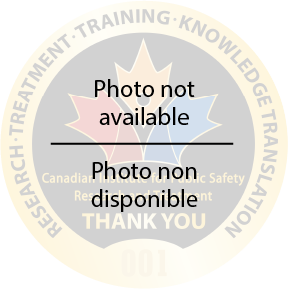
Cst. Steve Beck
RCMP, G Division
When Cst. Steve Beck began to notice symptoms of poor mental health, he wasn’t sure what he was experiencing. He had to overcome internalized and organizational stigma because of the view that having a mental health injury makes you weak and incapable of doing the job.
He’d aided others in the past, helping them in finding mental health supports, but he had never thought he would need these supports himself.
“Over time, you completely disregard yourself because you don’t feel that you’re being affected by trauma in the ways you actually are. You can’t continue to internalize that stuff and expect it to go away because it doesn’t go away. And if I learned anything through this, it’s that. I went until I was numb and broken, and it was almost irreversible.”
After realizing he had an injury, Steve decided to share his story with his colleagues. He wanted to let people know it was okay if they felt the same way. Once he shared his story, others started to come forward; friends and role models said his honesty inspired them because they were also struggling.
At first, Steve was frustrated; he wished the people he looked up to had come forward sooner. He wished more people had been honest before so many colleagues had died by suicide.
Steve believes the best thing organizations can do for their staff is to increase openness about mental health, and provide sustained peer support beyond a one-time critical incident debriefing.
“In a major event, the community rallies around, and it is inspiring. Everybody is with you. It is busy for a while, and you are working hard on that file, but it’s later, when everything goes quiet that you are suddenly left with the memories. That’s the part that needs to be dealt with- that follow-up after the fact.”
Steve also thinks it’s essential that PSP be educated about mental health. When he experienced PTSD, it was not with the symptoms seen often in the media, like nightmares and flashbacks. Instead, Steve had cognitive symptoms like memory loss and lack of attention that alienated him from his loved ones. So, more education about the full spectrum of symptoms is essential. Steve also thinks this education needs to come at the beginning of a PSP’s career.
“When we are at Depot, they teach us to fight to protect our bodies but not how to protect our mental health. We also need to be taught it is okay to ask for help,” he said.
Steve’s honesty has been an inspiration. His nominator Vicky King was still new to the organization when she heard Steve share his story. Steve’s openness with his mental health journey impacted Vicky.
“He created a safe space for open dialogue about mental health and its impacts. Within the session, I listened to his words and felt his genuine care and concern for us “on the line”, and his heartfelt desire that no one should have to suffer alone because of stigma around reaching out for mental health support. I was inspired to reach out to our organization’s mental health unit,“ she said.
Looking back now, Steve says he is a far better father and police officer because of his mental health journey. His continued openness is what makes Steve a Champion for Mental health.
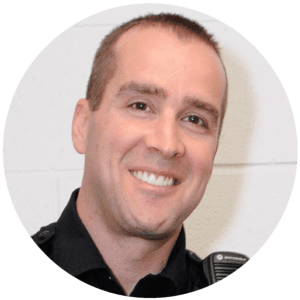
Sgt. David Bohdal
Health and Wellness Coordinator, Windsor Police Service
Sergeant David Bohdal tells me that being a Champion of Mental Health was never his aspiration. As a busy father of five, with a wife who is an ICU nurse, David simply enjoys connecting with people. In 2017, his small police service in Amherstburg began a peer support program, and David was nominated to the team. It was a small service of approximately 30 people, so it was just an extension of the connections he had already built. In 2019, the Amherstburg police service was integrated into the larger Windsor Police Service, with over 600 officers.
Shortly after this change, David was offered the chance to attend an R2MR trainers course. Those attending the course were from different PSP sectors. Getting to see how other professions experienced a traumatic event was an eye-opening experience for David.
“Think of something like a car accident, you’re so used to your perspective but the course allowed me to see from different professional angles.”On the last day of the course, the Windsor Police Service posted a new position for a Health and Wellness Coordinator. Reading the posting, David realized that if he could have written the perfect job for himself, this would be it. He knew it was a job he was meant to do.
At first, David wasn’t sure if the support he offered, such as showing up at a traumatic call, was helping anyone. However, he is also quick to point out that since he started his new role, no one has said, “that’s nonsense, you’re wasting your time,” which David thinks shows some progress on stigma reduction.
Working through his first couple of years in the role, with the added challenge of COVID restrictions, has been challenging but he is starting to see results.
They have developed an early intervention program that schedules check-ins after a person has had several traumatic calls, a reintegration program that is helping people return safely to work, and a safeguarding program for units that are at high risk, such as officers in the internet child exploitation unit.
David credits a great team of peer supporters and a local psychologist Dr. McGrory for some of the success in his new role. He has used the position to expand his influence by serving on several mental health-related committees in Ontario, including the Joint Knowledge Sub-committee, Anti-Stigma Advisory Table, and Ottawa Hospital Community of Practice.
David’s nominator, Leah Dunbar, highlights the impact he has had,
“Ontario has benefited from his experiences. Through committees, he is able to have an impact on 80,000+ Ontario PSP. A passionate advocate and knowledge mobilizer, his contributions over the last year and beyond have, without a doubt, made positive impacts on PSP MH across Ontario. Dave Bohdal is a Champion of Mental Health.”
CIPSRT agrees that David has gone above and beyond. However, for David, it is just a job he enjoys.
“I understand that no one will see the benefits or the success stories in a lot of the work that I do, because most of it is confidential. I am perfectly fine with that. If this is what I do for the rest of my career, I’ll be very happy.”
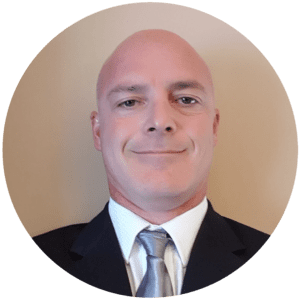
Michael Brundritt
Border Services Officer, CBSA
Michael (Mike) Brundritt knows you can’t look at someone and see the state of their mental health. Over 18 years as a part of CBSA’s EAP program (peer support), Mike has used his natural communication skills to build strong relationships with others, so they feel comfortable sharing their difficulties. Mike learned the value of that support when he went through his own trauma in 2017. He had spent so many years helping others that everyone’s responses became a reminder that he was part of a supportive community.
Over the last few years, Mike has seen fundamental changes in how his organization supports mental health. He sees more awareness of the importance of self-care and more positive messages about mental health support, but he also knows that there is always room for improvement. There is still a stigma that goes with mental health in PSP work. Mike knows stigma can be reduced if you have opportunities for open conversations without bias or judgment. Talking about something enough can break down stigma and help people feel comfortable coming forward. He believes that organizations have a role in limiting barriers to support, but that everyone must be willing to advocate for their own mental health.
Mike’s nominator Laurie Grant has seen how Mike’s openness has helped others,
“Mike experienced personal tragedy in his life. However, instead of letting that tragedy bring him down he has brought his story forward to share, and to encourage others to keep going. He is very open about his own struggles, and at the same time listens to other people’s hardships. He is always the first one to ask how you are doing, and he genuinely wants to know. I know I can always rely on Mike.”
Mike doesn’t just enable open communication in the workplace; he actively supports employees’ well-being by being the leader of his local wellness committee at the Ambassador Bridge. The wellness committee, which was started to create a group BBQ, has evolved into holding regular events that help to build morale and make the workplace enjoyable, leading to fewer sick days and missed time.
Mike quickly points out that though he took the lead on the committee, it is a group effort, with many of the events focused on supporting injured co-workers. Others have also noticed the work of the wellness committee in the CBSA and the local Windsor community, which has helped the committee look for ways to expand its ideas.
The fun work environment Mike has helped create is a testament to how a little can go a long way and is just one of the reasons why Mike is a Champion of Mental Health.

Shauna Burns-Thomson
Correctional Program Officer, Correctional Services Canada
When Shauna Burns joined Correctional Services Canada, she noticed her peers struggling, and many were burning out. Shauna’s background in mental health enabled her to see that the workplace was having a significant impact on the mental health of employees; this was especially noticeable during the COVID pandemic. When an opportunity became available to take on the EAP and CISM lead position, Shauna decided to step up. In her new role, Shauna found that many of her co-workers didn’t have the tools they needed to deal with the everyday situations they would encounter.
“Every incident you have, every stressor, or complication is like tossing a pebble into a backpack, and you don’t know at what point the backpack will break.”
Shauna found that while there were good programs in place, like CISM, they had become just a check box for management, and that attitude had trickled down to the staff. She found that when she reached out to offer support, it was shrugged off because the program had no weight; it was just something that had to be completed before you moved on. While Shauna knows it’s easy to pick out the negatives in the programs, she has worked on building trust with her fellow workers. She wants them to know when a peer shows up, they are committed to putting in the work to make sure employees are okay.
“When one person isn’t doing okay, we all suffer. You can stand by and be part of the problem pointing out all the ways there are issues, or you can choose to stand up and make a difference.”
Based on the three nominations she received for Champions of Mental Health, she is clearly making a difference in her organization. Her nominators also point out that Shauna’s work, which is vital for staff, has also been extended to inmates in need of support.
Shauna knows stigma toward mental health still exists in her organization. Many continue to believe that admitting the need for help is admitting to weakness. There are also several barriers to accessing mental health supports when people do decide to take time off to support their mental health. She says obstacles such as paperwork and reporting structures can feel overwhelming when you are just struggling to get out of bed. Shauna is working hard to dispel the myth that those needing mental health support are weak, and instead works to make it easier for people to get help. One of her recommendations to employees is to use their benefits to regularly check in on their mental health so that they don’t reach a crisis point.
“You get an oil change in your car, right? You’re not waiting until your car is broken down on the side of the road to get it looked at; you want to be proactive.”
Shauna knows that there is still room for improvement, and she is committed to helping, going so far as to get a master’s degree in Psychology so she could begin counselling outside of her job. When she thinks about making improvements to mental health she says relationships are critical. Shauna believes you need connection, camaraderie, and community to be mentally healthy.
At CIPSRT, we are happy to support Shauna’s efforts by naming her a Champion of Mental Health.
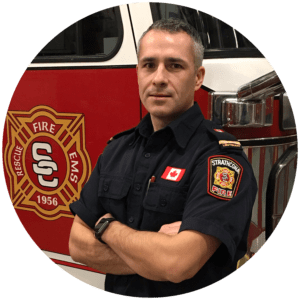
Lt. Ian Clavelle
Strathcona County Emergency Services
Early learning in his career, and an opportunity to work in a service that was “ahead of its time” in peer support set Lt. Ian Clavelle on a path to facilitating the mental health of his co-workers. As his career progressed, Ian expanded his knowledge with training in critical incident stress management and peer support. The loss of a close friend to suicide inspired Ian to become a peer support lead at his organization.
He realized,
“You can never tell what someone is going through.”
One of Ian’s nominators, Tyler Brady, points out how important Ian has been as a peer lead,
“I can not think of a single person who could do the job better. The mental health of our members is a passion to Ian, and he truly cares about our people. He does all of it while navigating a busy and successful personal and professional life.”
For Ian, being mentally ready for work is as important as being physically prepared. Anyone can be impacted by mental health challenges, having the ability to recognize when you might be in trouble is an important part of staying healthy. Ian has found that educating himself, and incorporating evidence-informed resiliency techniques, has been vital in maintaining his mental health readiness. He has also found that peer support is an important option. A peer who has been through similar things on the job can help make sense of abnormal events. Trained peers can be even more critical since they can help to lead members in distress to the support available.
Stigma was a huge barrier to accessing mental health support when Ian joined the service. He has seen improvement over time, but he knows there is still work to be done to make everyone comfortable treating mental health injuries as they would treat physical injuries. He believes organizations also need to be supportive and mental health training needs to be more than a box to check off. Organizations must be supportive in meaningful ways and at all levels, from the frontline to leadership. Ian has found in his current organization that disability management is essential. A caring human resources department coupled with good management can be vital for supporting mental health.
The importance of the management relationship was highlighted by Ian’s second nominator Denise Annicchiarico,
“Without his consistent efforts and willingness to work together, I feel that attaining buy-in from members would have been significantly more challenging, if not impossible. Leadership at all levels, especially within the union, is essential to develop effective health and wellness programs.”
When Ian is working as a peer, he becomes concerned that everyone is vulnerable, but he believes there are ways to get help, ways to get better. Ian’s hard work and dedication are inspiring, and CIPSRT is excited to recognize him as a Champion of Mental Health.

Natalie
Mental Health and Programs Coordinator, CSIS
It is Natalie’s job to help maintain a registry of employee assistance programs (EAP) and to organize training and workshops on mental health for CSIS. Natalie has consistently gone above and beyond for her co-workers. Since 2014, Natalie has focused on ensuring new resources are available for EAP, concentrating on recruiting providers that offer diverse and accessible services.
Early in the pandemic, Natalie noticed a lack of clinicians available to welcome EAP clients, so Natalie stepped up and became more directly involved in ensuring that people found resources in the community that would serve their needs.
As her nominator Sebastian indicated,
“Since the start of the pandemic, nearly 1,400 EAP clients will have been directly connected to appropriate help resources by Natalie.”
Natalie has also been committed to continuing her mental health education. She has completed mental health first aid training and a certificate in counselling; both have enabled her to improve her ability to help others in the organization. Clinicians have also used her expertise in the development of new training content for CSIS employees.
Managers who supported Natalie’s nomination have seen the benefits of Natalie’s proactive approach to her work,
“Over the years, Natalie has provided exceptional service and support to CSIS employees, especially over the past two to three years when the demand for EAP services has shown significant growth. The members of our management consider themselves lucky to have a coordinator of her calibre.”
As an organization, CSIS is used to working quietly in the background, often trying not to draw attention. This year CIPSRT is privileged to recognize one of its members as a Champion of Mental Health.
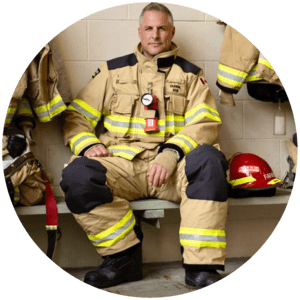
Captain Steve Farina
Coquitlam Fire Rescue
For Captain Steve Farina, it is easy to point to his inspiration for becoming a Champion of Mental Health. In 2015, two firefighters from his fire service died by suicide, and he said the experienced “rocked him to the core.” These tragic events, and additional suicides in the Vancouver Fire Service, launched Steve into mental health advocacy.
Steve recognizes that improving the mental health of first responders is not something that can be done overnight.
“Firefighters are stoic and need permission to take a knee, which is hard when there is still so much self-stigma, organizational stigma, and societal stigma around mental health, especially for first responders. They are the rescuers and are not used to being rescued.”
Steve believes that to improve mental health, leadership needs to embrace mental health support from the top down. “People,” he reflects, “are the greatest asset that organizations have. Organizations must ensure their people are as well-resourced as their fire truck, police vehicle, or ambulance.”
Steve suggests that organizations fund peer support and mentoring in their services, so that new people coming into the profession can have what he calls a “mental health Sherpa”, who can help guide them through some of the difficult situations they will experience in their careers.
Resourcing should also extend to PSP families. For years Steve’s fire service has hosted a spouse and families’ night, where a mental health professional, a CISM lead, and a Chaplain talk about available mental health resources. Steve believes that events and activities, such as this one, are another important step in normalizing conversations around mental health.
“Families are often the first to see the issue. If someone’s head is not in the game, it can be a safety issue for co-workers, so it is important to make the family part of the solution.”
Steve stresses that all the responsibility for improving mental health can’t rest with the organization. Building individual resiliency is also essential. “Your resiliency is the only thing you can control. ”
One of Steve’s nominators, Chris Bond, is quick to point out the impact Steve has had,
“Steve is always looking proactively for ways to reduce the level of psychological damages from acute exposures and cumulative exposures. I can’t express enough how Steve has succeeded in changing our work culture in terms of mental health and wellness and self-care.”
Discussions with Steve leave no doubt about his passion for supporting the mental health of his brother and sister firefighters. His commitment is inspiring and makes Steve a Champion of Mental Health.

Rhonda Harte-Pittman
Nurse Manager, B Division RCMP
The dedication, personal sacrifice, and absolute perseverance of Rhonda Harte-Pittman’s RCMP colleagues have inspired her to promote mental health and wellbeing. She views the promotion of mental health and wellbeing as her way to contribute, and says, “I truly believe amazing things can happen when we lift each other up.”
Rhonda recognizes the need to normalize mental health in PSP organizations. She sees that misconceptions and stigma surrounding mental health still exist in these organizations. She says that when organizations create an open and safe environment, people feel supported and empowered to seek help.
Rhonda recognizes that part of that support must also go to the employees who work in the field of mental health and wellbeing.
“It is of critical importance to ensure employees who work in the area of wellbeing and mental health are strongly supported within an organization. These employees need to be provided with the appropriate training and tools, as well as support systems put in place to facilitate their continued wellness.”
Rhonda knows that support has improved, but she still points to five areas where organizational support is still needed:
- mental health and resources awareness initiatives,
- mental health communication skills training,
- leadership training on emotional intelligence,
- a strong peer support program, and
- development of evidence-based mental health accommodations in the workplace.
Rhonda has found that a “mental health in all” approach is the best, where all levels in an organization work together to develop initiatives that can be embedded into the organization’s policies.
Rhonda has worked to develop several in-service programs, which she says provide an opportunity for people to discuss mental health in a safe and open place.
For her nominator, Jennifer Ebert, Commanding Officer at B Division, Rhonda’s work has been critically important for the division,
“She is the first to volunteer for any new initiative, and on any given day, she is always looking for new ways to address ongoing issues. Her leadership within the CISM program has ensured the safe and healthy return of many RCMP employees who may otherwise have been lost.”
Rhonda’s dedication is inspirational and CIPSRT is proud to recognize her as a Champion of Mental Health.

Judy Hollett
Peer and Family Support Coordinator, Emergency Medical Care
It was Judy Hollett’s personal struggles with mental health that inspired her to “step up” for others. Judy experienced stigma when she came forward with her mental health issues. She was criticized and judged in her workplace causing her to isolate and step back from her co-workers for several years. While engaging in healing, Judy found that people were like icebergs, with much of themselves invisible below the surface. She realized that it would be hard for co-workers to know what was going on in her mind without her sharing it, which is why she feels it is vital for organizations to clearly articulate that it’s “okay not to be okay.”
As Judy’s nominator Paula Martell points out,
“Judy has shared her own experiences and how she has developed resiliency skills through her mental health journey. She allows herself to be vulnerable, and by doing so, others feel safe to do the same. That comfort in being vulnerable is contagious, and she has instilled the importance of this skill in her team and all the people she supports.”
Judy knows it is important to help others understand that they won’t be ridiculed or ostracized for struggling with mental health; instead, they will be offered support.
That support begins with educating PSP about mental illness and mental health. Judy believes it is important to help people help themselves by letting them know about available supports. It’s also vital to help them understand that taking care of their mental health takes ongoing work. As Judy says, “you wouldn’t go to the gym once and think you are fit; taking care of yourself has to be a lifelong commitment.”
For Judy, her daily “mental health gym” routine combines meditation, journaling, visualization, and positive self-talk. She also thinks that building resilience through programs such as R2MR or strategic resilience for first responders, is essential for PSP. Communication is also an important component. Listening to people without judgment and building on the values of each generation in the organization is critical to creating an environment that supports mental health.
Judy believes that organizations have a role to play in providing support, training, peer support, and in creating an environment that supports members who come forward with mental health issues. Members, however, still have to be ready to take that initial step toward getting help.
Judy works hard to be there when someone takes that first big step to ask for help, which is why she is a Champion of Mental Health.

Cpl. Katharine Jackson
Historical Homicide Unit- RCMP
Cpl. Katharine Jackson has spent her career investigating some of the worst crimes. She has felt the pressure to be the perfect RCMP officer, helping support Canadians on their worst day. Her work has taken a toll on Cpl. Jackson’s mental health, leading to a diagnosis of PTSD and thoughts of suicide. It was learning about the death by suicide of a colleague, however, that spurred Katherine to share her own story.
Cpl. Jackson volunteered to tell her story in a video shared throughout the RCMP. She knew that having worked in high-profile assignments and being well-known in her division would give her story significant impact. Cpl. Jackson wanted to tell others, “It’s okay to be broken, you get fixed, and it is okay to get fixed.”
At first, Cpl. Jackson was fearful that as a result of the stigma around mental health, she would receive poor feedback on her video. Though openly everything was positive, she knew that some in the service viewed her differently, and she accepted that. She believes that the more people come forward, the better, even if someone doesn’t want to share in public, just sharing with a peer is a crucial step to better mental health.
Cpl. Jackson found that the support of an online therapy program made all the difference. At first she didn’t see any benefits; but as she stuck with the sessions and did the homework, she found her thoughts were changing. Now she has the tools and knowledge to know when she is “slipping” and needs to focus on her mental health. She still has hard days, but she has learned how to cope.
Cpl. Jackson knows that there are still areas for improvement in her organization can make to advance mental health support. Long wait times for psychologists have her suggesting that alternatives such as social workers and counsellors be recognized by the organization as support options, especially in rural communities that often have more barriers to care.
“We can’t put mental health on the back burner,” she says.
The sharing of her video and her work with the Proactive Support Response Team in B.C. has had a significant impact, as her nominator Michael McCauley points out,
“Corporal Katharine Jackson, is a hero to her organization. Her courage to become an advocate for mental health within the RCMP and to dedicate herself to remove barriers to wellness has no doubt saved lives. While it will never be quantified, I have no doubt her openness has and will continue to help countless police officers.”
CIPSRT is happy to be able to recognize the excellent work of Cpl. Katharine Jackson a true Champion of Mental Health.

Adib Kaddoura
Correctional Officer, Correctional Services Canada
For Adib Kaddoura becoming a Champion of Mental Health was an accident. Mental health was rarely discussed when Adib started working with the correctional service over 23 years ago. Adib says he was one who was skeptical of co-workers who suffered from mental health injuries. Even when he joined the CISM team in 2010, he wasn’t sure he bought into the need to support mental health. But that all changed as staff began to reach out to him for support. Within his first few years in CISM, he saw that many staff members were hurting and had few tools to cope. Adib realized that a need for support was not a sign of weakness but a sign of injury. This realization began Adib’s journey to understand mental health, and the effects of traumatic events, on those who work in corrections.
“We care so much about physical injuries, but emotional and mental injuries are still dismissed at times. We question mental health injury more, thinking it is fake or something people are using to get something from the employer. That is something that needs to be addressed, and we do that by having people in organizations step up.”
Since those early days in CISM, Adib has been driven to improve the mental health of his co-workers. Spending his own money, he became certified as an ICISF-trained peer support facilitator. Adib now delivers standardized training to peers across multiple provinces. He says he has seen improvements in how his organization treats mental health. He believes, however, that the focus on mental health supports is in its infancy and more research is needed to support PSP struggling with mental health issues.
Adib also believes that it’s important to work on reducing stigma, both at the individual and organizational level. He has seen connections between co-workers collapse with the increased use of social media, and increased isolation during COVID. Still, Adib believes that work on building back connections is essential. He also thinks that small investments by organizations, even snacks and drinks at training sessions, can go a long way to making people feel like the organization is there to support them.
In her nomination, April Sawatzky points out how Adib has had an impact,
“Mr. Kaddoura is a man of great strength and resiliency. He is patient and kind and has a positive attitude, despite working in a negative, volatile, violent environment. He is passionate about helping his peers navigate through critical incident stress.”
In talking with Adib, you can see his passion for helping his co-workers, and it is that passion that makes Adib a Champion of Mental Health.
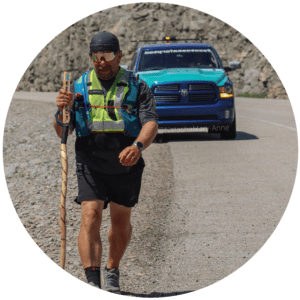
Chad Kennedy
Alberta Sheriff Branch- On Leave
Chad Kennedy experienced the impacts of post-traumatic stress injury early in his life, as he watched his father, an RCMP officer, struggle with Post-traumatic Stress Disorder (PTSD). In 2018, Chad received his own PTSD diagnosis, but it was attending a bus rollover call in Jasper in 2020 that pushed Chad to consider suicide. In this low moment, late at night, Chad made a commitment over social media that he would walk across Canada to start a conversation about PTSD. Viewing the post in the morning, Chad questioned if it was possible, but he soon decided to take the leap and embark on his journey, which is how Sea to Sea for PTSD was born.
Chad sees the stigma associated with mental health as one of the biggest obstacles to PSP admitting that they are experiencing mental health difficulties. He found that in the PSP community there were some who saw mental injury as a weakness, and encouraged an attitude of “just suck it up”. It is because of these misinformed attitudes that Chad believes starting conversations about mental health is so important.
As his nominator Michael Berns points out,
“Chad is an amazing individual that has literally interrupted his life to contribute to erasing the stigma around mental health and promoting reform amongst the first responder community on how mental health is viewed and dealt with.”
Chad knows that to reduce stigma, education is vital. As part of his efforts with Sea to Sea, Chad hopes to develop a program that can be provided to PSP as they start their careers. He believes it is important that PSP have the tools to support their mental health right from the beginning. For Chad that tool is taking walks.
“PSP are always responding to someone else’s emergency, but it is important to take the time to clear your head so you are ready to respond,” said Chad.
Chad and other members of the Sea to Sea for PTSD team have covered the country from Cranbrook to Montreal. They will begin touring again next summer, travelling from Quebec City through the Maritimes. On his travels across the country, Chad has spoken to countless PSP, military members, and their families. His childhood experiences have also made Chad aware of how important it is for families to be supported and to be educated about mental health.
What started as a spur-of-the-moment idea has led Chad on a journey across Canada, and within himself. Walking has allowed him time to think and forgive. He now says that this walk was “life-saving and gave him focus.”
CIPSRT is proud to recognize Chad’s efforts as a Champion of Mental Health.
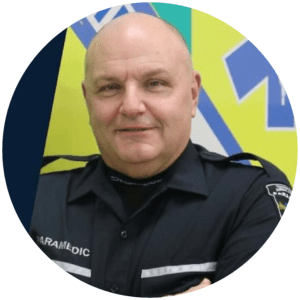
Martin Léveillé
Paramedic, Dessercom
Paramedic Martin Léveillé has had his own experiences with mental health challenges, which have given Martin a unique perspective on the issue. Watching uniformed professions not take mental health seriously, while allowing discussion around mental health to be taboo, encouraged Martin to become involved, and to share his own story as a way of normalizing conversations around mental health. Martin started with an online video where he spoke about his journey and his time in a treatment program.
This openness was just the start. As his nominator, Mylène Gilbert, points out, Martin now helps others who are seeking help.
“He offers his time, guidance and the necessary support to facilitate their process. He takes the time to meet them at work or at home, to be an attentive ear and to guide them to the right resources. If they are off work Martin will then ensure their successful reintegration into the workplace.”
Martin has seen that physical injuries associated with the job are openly discussed, while psychological injuries are not. For Martin, being well in mind and body is vital to performing at work. Martin believes organizations need to go beyond employee assistance programs and to instead focus on mental health education, training, and peer support programs with trained peers. He believes that education is essential to demystify mental health issues.
According to Martin, PSP must hear about mental health positively so that when they seek services, they consider the mental health injury in the same way they would any other injury they might experience on the job. Martin’s dedication to helping others makes him a true Champion of Mental Health.

Matthew McKeage
Primary Care Paramedic, Associated Ambulance
Being a Champion of Mental Health wasn’t on Matthew McKeage’s to-do list. As we chat, he insists that credit goes to his team and all the staff involved in improving mental health. He even gives a “shout-out” to Becky Brown, a fellow nominee for this year’s award. Matthew says as a paramedic, he comes to work wanting to make his community, and the world at large a better place, and his efforts for improving mental health in his organizations are just another way of doing that.
While Matthew views improving mental health as a team sport, his nominator Jeff Sych is quick to point out Matthew’s contribution,
“Matt is an incredible person who has advocated for the betterment of mental health support for his colleagues and paramedic community members for many years. With a background in mental health working with victim services and addiction populations, becoming the Team Lead for his organization’s peer support program was a natural fit.”
Matthew shares the following when asked why it is important for people to step up for mental health in PSP organizations.
“There is a joke that paramedics don’t retire. The average career is five to seven years, and it has been treated as a fact instead of trying to find out why. Organizations must understand that having programs and training will help keep people safe and happy at work.”
Matthew believes that organizations and individuals working together to help support evidence-based and clinically-supported peer support means workers can have a safer and happier work life.
He says a critical factor is ensuring that workers understand the hazards of a career in paramedicine.
“There needs to be more information at the start of a paramedic’s career about the impacts the job can have on you emotionally and mentally. That can come from good mentorship from older paramedics. “
Matthew still sees stigma concerning mental health but he’s also seeing improvements in paramedic culture. He stresses, however, that if people are comfortable coming forward with mental health concerns, organizations must ensure that support is available. It becomes problematic if members ask for help, only to find there is no help available.
Nominator Malcolm McNeill highlights Matthew’s dedication,
“Matt has diligently worked to make asking for help more acceptable in his organization. Many of his colleagues were able to seamlessly access effective support and continued care because of his work.”
Matthew is now turning his dedication to a new project. In January, he hopes to debut a podcast he has developed with the help of mental health professionals. The podcast will educate PSP about mental health, psychology, resiliency, and coping skills. He hopes the podcast will assist PSP in better connecting with people in the community who are experiencing mental health issues, and will help PSP to recognize when they need support with their mental health.
Matthew’s innovative approach to supporting mental health is the reason CIPSRT is excited to recognize him as a Champion of Mental Health.
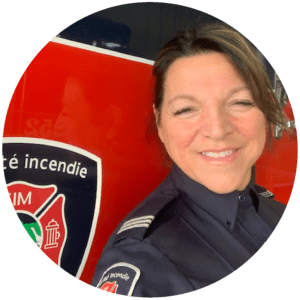
Captain Nathalie Ménard
Montreal Fire and Rescue Services
Captain Nathalie Ménard learned the importance of understanding mental health early in her life. Exposed to mental health problems as a child, Nathalie wanted to understand her experience and share what she learned with her colleagues at Montreal Fire and Rescue Services. Through her time as a peer supporter as well as nine years as the officer in charge of Montreal Fire’s EAP program, Nathalie has learned that all PSP have the “soul of a saviour”; putting on the uniform can make PSP feel invincible. However, she has also found that the shield a uniform provides can crumble, leaving behind a person who needs and deserves support.
“One part of the support needed by PSP is the demystification of mental health. Barriers can be broken by promoting, understanding, and normalizing the need for mental health support, preventing stigmatization and judgment,” said Nathalie.
Nathalie knows that it is vital to have a wide selection of supports such as self-assessment tools and learning opportunities, but she also understands that not every service has the budget to develop tools. She suggests that larger services with more resources work together to create prevention materials and to share these materials with smaller services that don’t have the same resources. Nathalie’s spirit of collaboration was highlighted in her nomination for the Champions award. Her nominator Deputy Chief Michel Amesse noted that Nathalie’s advice is also sought by partner services in the development of their mental health support practices.
When asked about the most important tool organizations can put in place to support mental health, Nathalie is quick to say peer support, which she says is people on the ground who can listen, disseminate information, and ultimately help reduce the stigma around coming forward with mental health concerns. She also highlights that organizational support is critical so that when a PSP raises their hand to say they have a problem, they are seen and heard.
Captain Nathalie Ménard is coming to the end of her service with Montreal Fire and Rescue Services. Deputy Chief Amesse closed his nomination by saying,
“Captain Nathalie Ménard will certainly have left her mark on the Montreal Fire Service through her remarkable contribution and desire to share her knowledge to help others. For these reasons, we believe she fully deserves the title of mental health champion.”
We at CIPSRT agree, and we are happy to name Captain Ménard a Champion of Mental Health.
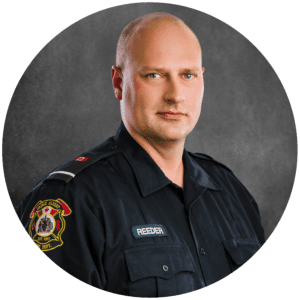
Firefighter Jeff Reeder
Prince Albert Fire Department
Early in his career, Jeff Reeder experienced a traumatic incident. That incident snowballed and led, years later, to a diagnosis of PTSD. At that time, there was not a lot of support for mental health in his fire service. The service offered a debriefing after a bad incident but provided no follow-up. When Jeff finally sought help, he found it difficult to know what to do. He didn’t feel that the counselling he received supported his desire to remain a firefighter. Nine months later, Jeff didn’t feel back to normal, but his treatment time had ended. He went in search of other resources. As a lover of horses, Jeff tried equine-assisted therapy. He found that his symptoms started to improve over four months. He started feeling more like himself and could return to work.
Jeff’s experience inspired him to help others who were struggling with their mental health. Jeff is a member of the peer support team and finds that now there is more mental health education available. This allows members to recognize the signs of mental health issues and helps to normalize mental health concerns. Jeff sees peer support as a way to bridge the gap between resources and firefighters.
When the province of Saskatchewan passed presumptive legislation to recognize mental health injuries, Jeff welcomed the opportunity to provide the worker’s compensation board with his expertise. Using the B.C. program as a model, the Sask First Responders website was born, making it easier for PSP to find resources. Jeff says, “Everybody goes down to the gym, but no one is taking care of mental health. It was a priority to build a list of resources people could access.”
As illustrated by his nominator Paul Hills, Jeff was also willing to share his own story,
“Jeff has been vocal and outgoing with his own mental health journey to the point of being a main spokesperson for WCB and their mental health website. He has been willing to do videos or public speaking as needed to use his story to help others understand that mental health is a journey that can end on a positive note with the right help.”
Working in a smaller community, Jeff also sees the lack of counselling resources as a barrier for many PSP. The lack of counselling resources is one of the reasons why he has partnered with other PSPs to create a peer-led retreat that helps PSP rest and recuperate. While the retreat is peer-led, peer leaders also ensure that those who attend have access to professional resources.
Jeff understands the importance of ensuring that supports offered to PSP are evidence-based, which is why he is working with researchers on a study of equine therapy in PTSD. Jeff is hopeful that the study will show similar results to those he experienced personally, so that equine therapy can be an option for other PSP.
Jeff’s willingness to step up for the mental health of his fellow PSP makes him a Champion of Mental Health.
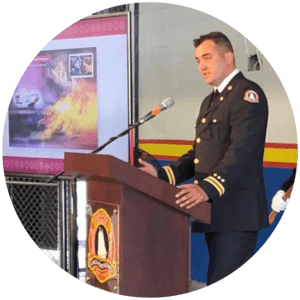
Captain Mike Sears
Halifax Regional Fire and Emergency Services
Nova Scotia VP of the Professional Firefighters Assoc.
Captain Mike Sears never intended to be a Champion for Mental Health. When he started working with the Halifax Regional Fire and Emergency Services, the belief that “emotions are weakness” was prevalent in the organization. It wasn’t until a few years later, after a particularly nasty call, that he came in contact with a newly-formed peer support group. A peer supporter explained to Mike that the “kicked in the chest” feelings he had after a call, might be related to his mental health. The peer’s follow-up helped Mike to see that he might need to speak to a professional. Once he had taken care of his own mental health, Mike quickly started helping others to access peer support. He referred so many co-workers that the head of peer support asked him to join the group.
Mike’s openness was something highlighted in his nomination by Joseph Triff,
“Mike has been open and willing to speak about his own mental health challenges as they related to his work as a firefighter and Captain with Halifax Fire for the past 20 years. Mike is one of the people from our organization who goes to speak with all our new firefighter classes about the importance of taking care of your mental health, and he uses his own experiences and challenges to educate them.”
Mike continued as a peer supporter until recently when he lost a close friend, and someone he was peer-supporting, to suicide. That loss, and the stress of the pandemic, caused Mike to take a step back; realizing that after years as a peer supporter he could no longer take on other members’ traumas. Instead, Mike now works to support peer supporters. Mike, and the parents of the close friend, who passed on, formed the “Fight 4 Life” charity. They are currently working to bring much-needed training to peer supporters, so that peer supporters have the tools to protect their mental health while serving others.
Mike has also worked on WCB Nova Scotia’s first responder committee as part of his goal of helping to make a difference to mental health supports. He has seen improvements in his time as a firefighter but admits there is still a long way to go. When speaking of what organizations can do to support the mental health of their employees, Mike says, “Workers need to feel fully supported, not just check box supported by their organizations.”
Mike sees peer support as essential because, “if we don’t do it, we won’t listen to anyone else.” Mike also thinks it’s necessary to consider finding professional support before you need it. He suggests that scrambling to find someone when you’re in crisis doesn’t make for a great therapeutic relationship. Mike stresses that it is vital to think of therapy like any other wellness profession. He points out that people spend time finding a chiropractor or massage therapist they like. He says the same time should be spent finding a psychologist because “it is likely that doing this work [as a firefighter], you will need professional support sooner or later.” According to Mike, organizations also need to prepare their members for the mental health challenges they will face. He believes that training about available mental health supports should become a standard, and regular, part of the member training rotation, similar to the regular training done on winter driving safety.
Mike is comfortable in who he is as a firefighter and says he has “nothing to prove.” It’s this self-assurance that has enabled Mike to step forward in support of others, and become a Champion for Mental Health.

Sgt. Sachin Verma
Transitional Serious Organized Crime, RCMP
Sgt. Sachin Verma didn’t set out to be a Champion for Mental Health, instead he felt that by sharing his personal story he was answering a need in his organization. Sachin felt he had taken too long to deal with his own mental health issues and didn’t want that to happen to others. As he began speaking to colleagues, he found many were worried about being diagnosed and pulled from work, or they thought themselves frauds for making operational stress injury claims.
Sgt. Verma believes it is essential for visible members, especially people in more senior roles, to step forward in favour of addressing mental health issues. Seeing more people willingly share their story enables others to come forward with the knowledge that they will be accepted. For Sachin, the more people involved in supporting mental health, the better,
“We need to focus on reducing the fear that people who come forward will become stuck in, or lose, their careers,” he says.
Sgt. Verma’s dedication to creating a safe place to talk about mental health was recognized by his nominator Cpl. Amar Gosal,
“Sgt. Verma’s transparency about seeking assistance regarding mental health has opened the door for many to feel more comfortable. The RCMP promotes diversity and inclusion, and Sgt. Verma, as a racialized individual, has mentored many colleagues from the same community dealing with mental health barriers and challenges.”
Sgt. Verma stresses that more education needs to be provided so that individuals know how to access resources within their organizations. In his years as a peer supporter, Sachin has seen improvements in the way in which the RCMP supports its members. He also notes that COVID has been challenging, reducing in-person services, and limiting the number of psychologists taking on new patients. He continues to work with the organization on the development of new avenues for improved access to mental health assistance.
For Sgt. Verma helping others is his way of paying it forward for members of his organization.
“I do it because I wish someone would have done it for me,” he says.
He might not see himself as one, but CIPSRT is proud to recognize Sgt Verma as a Champion of Mental Health.
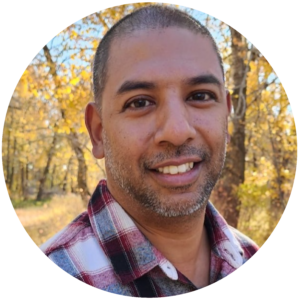
Asher Yaqoob
Correctional Officer- Correctional Services Canada
Five years after joining the Correctional Service of Canada, Asher Yaqoob started noticing the prison environment’s toll on his mental health. He also observed significant stigma associated with mental health among his co-workers, which Asher felt kept his fellow correctional officers from reaching out for help.
Wanting to help support others, Asher joined the CISM team at his institution in 2017. Asher finds working on the CISM team rewarding. As his nominator, Taylor Austin noted,
“Asher has been open about his own mental health struggles while he tries to raise awareness of the real impact traumatic incidents and occupational stress can have on mental health.”
Asher believes that skills for managing the mental health challenges of corrections work should be developed during recruit training. Recruits should be equipped with coping skills, practicing self-care, and with available onsite and community supports. Asher says one tool he would share is the practice of mindfulness.
“It is vital to slow down and focus. Mindfulness can also open the door to healthy conversations about mental health,” said Asher.
Taking his work in the CISM team to the next level, Asher pursued a master’s degree in Forensic Psychology and has become provisionally registered as a psychologist. Asher hopes that once he has completed all his registration requirements he will be approved to run a pilot program providing an onsite psychologist/mental health specialist in his institution. According to Asher, the initiative needs to start with an individual who has lived experiences, and who understands the environment and its challenges. Asher is inspired by the work done by the Calgary Police Service mental health program, and he wants to bring that level of care to his own institution.
Asher knows that change has to come from within the prison environment by people stepping up to promote mental health. He believes in creating a workplace where mental health and safety can be talked about openly, and employees can go home to their families with their mental health intact. We at CIPSRT agree and are proud to recognize Asher as a Champion of Mental Health.